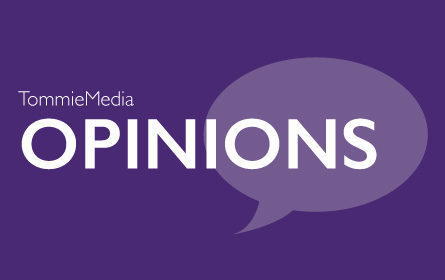Stop me if you’ve heard this one before: A Republican presidential candidate said something that offended people.
That seems like an everyday occurrence at this point, but Ben Carson’s comments during a Meet the Press interview about a hypothetical Muslim president highlight an exceptionally short-sighted perspective that I fear affects a large swath – perhaps even a majority – of the voting population when electing a president.
When asked whether a candidate’s faith should matter in consideration for a presidency, Carson eventually said that he would object to a Muslim president who was unable to adapt his or her beliefs to American law.
“I would have problems with somebody who embraced all the doctrines associated with Islam,” Carson said. “If they are not willing to reject sharia and all the portions of it that are talked about in the Quran – if they are not willing to reject that, and subject that to American values and the Constitution, then of course, I would.”
On the surface, Carson’s argument makes sense. After all, the government is in place to create laws and run the programs that carry out and enforce those laws. If the president were to put a separate set of laws before those they were supposed to enforce and enact, that would be problematic. That part of the argument isn’t why people are upset.
The objection to Carson’s argument comes from the implication that a Muslim would be unable to separate his or her religious beliefs from the job they were supposed to do. This implication is, of course, quite naive.
Virtually every religion has some problematic element of its doctrine that most followers now see as obsolete. By the implied logic of Carson’s argument we wouldn’t be able to have a president of any major religion. I assure you that no current presidential candidate would advocate for following, say, the Book of Leviticus literally.
In a vacuum, Carson’s comments don’t bother me. He made the point to say that the person in this hypothetical would have to blindly follow their faith – something that would make for a problematic presidency no matter what your faith is. But the reaction to his comments reveals a much more insidious problem with the political dialogue of the United States.
This is surely not the first occasion where faith has facilitated doubt about a candidate’s ability to lead. More than 50 years ago, JFK faced similar scrutiny regarding his Catholic faith. Much like the scenario raised by Carson, voters questioned whether Kennedy would put his faith and the doctrine of a foreign leader, the pope, above the policies of the United States. This was an issue in 1960, and it’s obvious we haven’t progressed much since then.
Days after Carson’s statements, Pope Francis arrived in the U.S. where he spoke about climate change, capitalism and social welfare, among many other things – most of which has upset large swaths of the Republican Party. What authority, Republicans say, does a religious figure have to speak on political issues?
And this certainly isn’t a new issue or new position. The issue of the Pope’s authority (and the political jostling that precipitates the question) can be traced all the way back to the Reformation and creation of the Church of England. The problem, however, isn’t of whether the Pope has legitimate authority to speak on particular issues, it’s that people want to disregard his opinion.
Just as some accuse Ben Carson of generalizing Muslims as one-dimensional people who are unable to see past out-dated parts of their faith, some want to make the pope a one-dimensional religious figure with no authority to advocate for an egalitarian society. It’s clear that Pope Francis speaks thoughtfully about topics that cross over into the political realm, and his words should be considered. If he decides to use his position to play his part in social change, more power to him.
All of this cuts both ways, too. Many who demonize Carson – calling him a racist or a bigot – are failing to acknowledge nuance in his argument and will likely ignore his ideas about other campaign issues. And as easy as it is to criticize the political right for its harsh words about the pope, the political left has its issues where it adjusts its policy to fit its agenda. Many who support same-sex marriage and marijuana legalization will argue that state law supersedes federal law when it comes to marijuana, but it works the other way around when it comes to marriage.
All in all, we’re stuck in a moment of time where nuance and critical thinking are overrun by buzzwords and party ideology. Muslims and Christians alike are able to look past certain elements of their faith, think critically and come up with a reasonable course of action that is both pious and moral, and Pope Francis is a shining example of that ability to adapt one’s faith to the modern world.
Jacob Sevening can be reached at seve8586@stthomas.edu.




